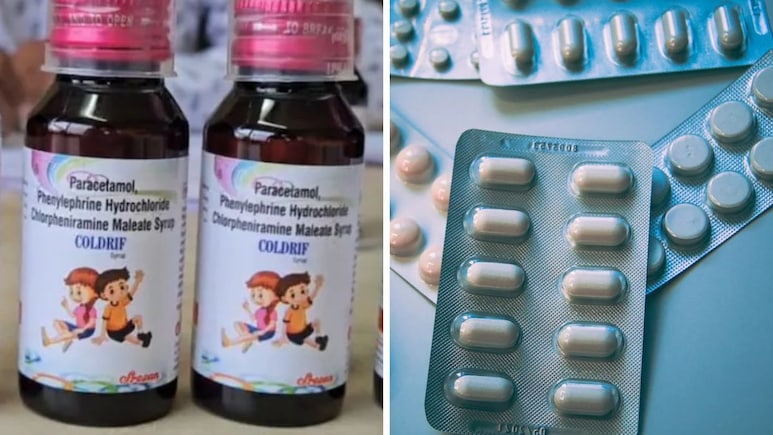
- A Comptroller and Auditor General report noted the state bought banned drugs worth Rs 1.8 crore
- The drugs had been banned by the Centre in 2016
- Among the banned drugs purchased by Madhya Pradesh were two fixed-dose combinations
Even as Madhya Pradesh reels from the tragic deaths of 23 children in Chhindwara due to a toxic cough syrup, a new revelation from the Comptroller and Auditor General (CAG) has exposed a deeper crisis in the state's drug regulation and procurement system.
The CAG's 2024-25 report reveals that the Madhya Pradesh Public Health Services Corporation Limited (MPPHSCL) continued to purchase and distribute medicines which were explicitly banned by the Government of India for human use, putting public health at risk.
Between 2017 and 2022, the corporation entered into rate contracts (fixed-price agreements) worth Rs 1.5 crore with pharmaceutical companies for these banned drugs and further procured medicines worth Rs 22.9 lakh through local tenders at the district level, bringing the total value of prohibited drug purchases to Rs 1.8 crore
The CAG report states that the Central Drugs Standard Control Organisation (CDSCO) had notified a list of 518 medicines and fixed-dose combinations prohibited under the Drugs and Cosmetics Act, 1940. These drugs were banned by the Union Ministry of Health and Family Welfare for manufacture, sale, and distribution for human use.
Despite this, the CAG found that the MPPHSCL not only executed rate contracts for such medicines, but also facilitated their purchase by state health institutions. Among the banned drugs procured were fixed-dose combinations of Metronidazole + Norfloxacin (which is an antibacterial and anti-amoebic medication), prohibited since March 10, 2016, but supplied through contracts dated October 27, 2016, and July 1, 2017, amounting to Rs 32.1 lakh. The combination of Azithromycin + Cefixime (which are anti-microbials) was also banned in 2016, but procured through contracts dated July 7, 2018, and August 16, 2020, worth Rs 1.2 crore.
The CAG notes that had the Corporation and the Health Department exercised due caution and removed these drugs from the tender lists, such purchases could have been avoided altogether.
Tracing the timeline, the report states that the Centre banned the fixed-dose drug combinations, including Metronidazole + Norfloxacin and Azithromycin + Cefixime, in 2016, and the Supreme Court upheld the ban in December 2017. The Centre reaffirmed the ban through a fresh notification on September 7, 2018.
However, Madhya Pradesh health authorities continued to justify their procurement, claiming that some of the combinations were supplied in kit form (in pre-packaged kits), a defence the CAG dismissed as untenable. The audit concludes that the state corporation's failure to comply with these repeated notifications and court orders amounted to gross negligence, endangering public health across government hospitals and primary health centres.
The death of 23 children after consuming Coldrif syrup manufactured by Sresan Pharmaceuticals has raised alarm over the drug quality control mechanisms in the state, and public health experts say the CAG report points to a pattern that made such a tragedy inevitable.
Track Latest News Live on NDTV.com and get news updates from India and around the world

